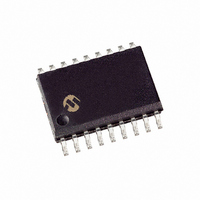MCP2515-E/SO Microchip Technology, MCP2515-E/SO Datasheet - Page 32

MCP2515-E/SO
Manufacturer Part Number
MCP2515-E/SO
Description
IC CAN CONTROLLER W/SPI 18SOIC
Manufacturer
Microchip Technology
Specifications of MCP2515-E/SO
Package / Case
18-SOIC (7.5mm Width)
Controller Type
CAN Interface
Interface
SPI
Voltage - Supply
2.7 V ~ 5.5 V
Current - Supply
10mA
Operating Temperature
-40°C ~ 125°C
Mounting Type
Surface Mount
Product
Controller Area Network (CAN)
Number Of Transceivers
1
Data Rate
1 Mbps
Supply Voltage (max)
5.5 V
Supply Voltage (min)
2.7 V
Supply Current (max)
10 mA
Maximum Operating Temperature
+ 125 C
Minimum Operating Temperature
- 40 C
Mounting Style
SMD/SMT
Lead Free Status / RoHS Status
Lead free / RoHS Compliant
For Use With
MCP2515DM-BM - BOARD DEMO FOR MCP2515/51MCP2515DM-PTPLS - BOARD DAUGHTER PICTAIL MCP2515MCP2515DM-PCTL - BOARD DEMO FOR MCP2515DV251001 - KIT DEVELOPMENT CAN MCP2510
Lead Free Status / Rohs Status
Lead free / RoHS Compliant
Available stocks
Company
Part Number
Manufacturer
Quantity
Price
Part Number:
MCP2515-E/SO
Manufacturer:
MICROCHIP/微芯
Quantity:
20 000
MCP2515
4.5
The message acceptance filters and masks are used to
determine if a message in the message assembly
buffer should be loaded into either of the receive
buffers (see Figure 4-5). Once a valid message has
been received into the MAB, the identifier fields of the
message are compared to the filter values. If there is a
match, that message will be loaded into the appropriate
receive buffer.
4.5.1
When receiving standard data frames (11-bit identifier),
the MCP2515 automatically applies 16 bits of masks
and
identifiers to the first 16 bits of the data field (data bytes
0 and 1). Figure 4-4 illustrates how masks and filters
apply to extended and standard data frames.
Data byte filtering reduces the load on the MCU when
implementing Higher Layer Protocols (HLPs) that filter
on the first data byte (e.g., DeviceNet™).
4.5.2
The
Register 4-17) are used to determine which bits in the
identifier are examined with the filters. A truth table is
shown in Table 4-2 that indicates how each bit in the
FIGURE 4-4:
DS21801C-page 32
* The two MSb (EID17 and EID16) mask and filter bits are not used.
ID10
ID10
filters
filter
Message Acceptance Filters and
Masks
DATA BYTE FILTERING
FILTER MATCHING
11-bit ID Standard frame
masks
normally
MASKS AND FILTERS APPLY TO CAN FRAMES
(see
associated
Register 4-14
Masks and Filters apply to the entire 29-bit ID field
with
ID0
ID0
extended
EID17
*
through
Standard Data Frame
Extended Frame
Preliminary
Data Byte 0
identifier is compared to the masks and filters to deter-
mine if the message should be loaded into a receive
buffer. The mask essentially determines which bits to
apply the acceptance filters to. If any mask bit is set to
a zero, that bit will automatically be accepted,
regardless of the filter bit.
TABLE 4-2:
As shown in the receive buffers block diagram
(Figure 4-2), acceptance filters RXF0 and RXF1 (and
filter mask RXM0) are associated with RXB0. Filters
RXF2, RXF3, RXF4, RXF5 and mask RXM1 are
associated with RXB1.
Mask Bit
Note:
n
0
1
1
1
1
16-bit data filtering *
X = don’t care
Filter Bit n
FILTER/MASK TRUTH TABLE
X
0
0
1
1
2004 Microchip Technology Inc.
Message
Identifier
Data Byte 1
bit
X
0
1
0
1
Accept or
Reject bit
Accept
Accept
Accept
Reject
Reject
EID0
n
















